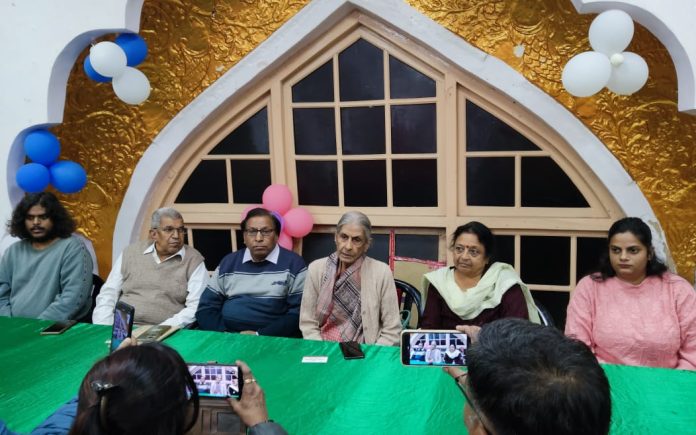Lucknow’s civil society convened a press conference to express outrage over the bail granted to three individuals accused in the 2023 IIT-BHU gangrape case. The survivor was reportedly forced to leave the campus due to fear and mental harassment.
The press conference featured prominent voices, including Professor Roop Rekha Verma, Rakesh Veda (IPTA), Madhu Garg (AIDWA), Kaushal Kishor (JSM), Mohammad Shoeb (Rihai Manch), Aakanksha Azad (BSM), Shantum (AISA), Naish Hasan (Social Activist), and Kanti Mishra (Women’s Federation).
On November 1, 2023, three individuals – Saksham Patel, Anand Chauhan, and Kunal Pandey – allegedly gang-raped a student on the IIT-BHU campus. These individuals were reportedly associated with BJP’s IT cell in Varanasi. The incident sparked widespread protests on the IIT-BHU and BHU campuses, which share a boundary. An indefinite sit-in protest was organised by BHU students to highlight this and other instances of sexual harassment, a recurring issue within the campus premises.
“When the movement gained momentum and media coverage, protesters faced violence. Female demonstrators were reportedly molested by ABVP members, allegedly with backing from the BHU administration and local police. FIR was lodged against protesting students under severe charges, including provisions of SC and ST Prevention of Atrocities Act, 1989. As a result, these students were suspended in September 2024 by the BHU administration for standing against the gangrape,” the statement noted.
The accused reportedly roamed freely after the incident, even participating in BJP campaigns during the 2023 Madhya Pradesh legislative assembly elections. Social media pictures allegedly show them with senior BJP leaders, including PM Narendra Modi, UP CM Adityanath, Smriti Irani, and JP Nadda. They were arrested on December 30, 2023, in Varanasi, where they reportedly confessed to other acts of harassment. However, after just 11 months in custody, they were granted bail – a development civil society members decried as a societal disgrace.
The speakers criticised a “perceived nexus between the executive and judiciary,” highlighting the stark contrast in treatment of political dissenters and individuals accused of serious crimes. Activists like Umar Khalid, Meeran Haider, Sharjeel Imam, and others remain in custody for years without bail, while individuals with political connections, such as Ram Rahim, Kuldeep Singh Sengar, and Chinmayanand, often receive judicial relief. “The judiciary’s bias is evident – it serves the interests of the ruling party while silencing dissent,” they argued.
The event was also attended by activists Farzana Mehdi, Asgar Mehdi, Arundhati Dhuru, Bhagwan Swaroop Katiyar, Rajeev Dhyani, and Shivam Safeer, who lent their voices to the growing outrage over the case.




